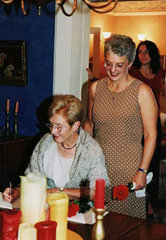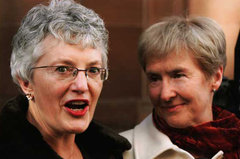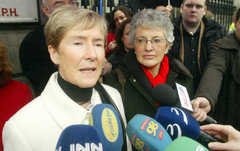History of the KAL Case
"...[To] the young people who right this very minute are preparing to marry... Can you imagine what it would be like if you were not allowed to marry the person you choose to love? That is what the judge has said to us."
Katherine Zappone, Our Lives Out Loud - In Pursuit of Justice and Equality
by Katherine Zappone and Ann Louise Gilligan,
published by The O'Brien Press Ltd., Dublin.
The Background:
 Wedding - 13.09.2003On 13th of September 2003 Katherine Zappone and Ann Louise Gilligan married in a civil ceremony in Vancouver, British Columbia, Canada. Their marriage is legally valid for all purposes in Canada.
Wedding - 13.09.2003On 13th of September 2003 Katherine Zappone and Ann Louise Gilligan married in a civil ceremony in Vancouver, British Columbia, Canada. Their marriage is legally valid for all purposes in Canada.
On their return to Ireland, the couple wrote to the Revenue Commissioners (the Irish tax authorities) to inform them of their marriage. They were seeking to claim the various tax allowances and financial advantages to which married couples are entitled in Ireland.
The Revenue Commissioners responded by informing the Katherine and Ann Louise that they would not allow their claim for tax allowances. This decision was made on the basis that although the Taxes legislation does not define the terms "husband" or "wife", the Oxford English Dictionary defines "husband" as a married man, and "wife" as a married woman.
The Challenge:
Katherine and Ann Louise wished to challenge the Revenue Commission's interpretation, and consulted their legal team (Phil O'Hehir of Brophy Solicitors, and their barristers Ivana Bacik BL and Gerard Hogan SC).
In November 2004, the legal team brought proceedings on Katherine and Ann Louise's behalf to the High Court, to challenge the decision of the Revenue Commissioners not to recognise their Canadian marriage.
This challenge was brought using the legal procedure of 'Judicial Review'. A judicial review allows the courts to review decisions of public bodies if those decisions have been made in breach of constitutional rights. In Katherine and Ann Louise's case, the High Court was asked to review the decision of the Revenue Commission not to allow their claim for tax allowances, based on the Oxford English Dictionary's definition of "husband" and "wife".
On November 8, 2004, leave (or permission) to take the challenge was granted by Mr Justice Liam McKechnie at the High Court. The first stage in Katherine and Ann Louise's case had been successful.
The Revenue Commissioners and the State filed a defence to the case in May 2005.
The case then proceeded for a full trial at the High Court, beginning October 3, 2006.
The High Court 2006: Key Players
Judge
Ms Justice Elizabeth Dunne
The Plaintiffs
Katherine Zappone
Ann Louise Gilligan
For the Plaintiffs
Mr Michael Collins, SC
Mr Gerard Hogan, SC
Ms Ivana Bacik, BL
Instructed by
Ms Phil O'Hehir, Brophy Solicitors
The Defendants
Revenue Commissioners, Ireland
The Attorney General
For the Defendants
Mr Paul Gallagher, SC
Mr Donal O'Donnell, SC
Mr Douglas Clarke, BL
Instructed by
Ms Fiona Woodyatt, Chief State Solicitor's Office
Notice Party
The Human Rights Commission
The High Court: Proceedings
Overview: Outside the High Court, 2006The main argument in Katherine and Ann Louise's High Court case was that they have a constitutional right to equality, a right to marry, and property rights under the constitutional protection of the family in Article 41 of the Irish Constitution.
Outside the High Court, 2006The main argument in Katherine and Ann Louise's High Court case was that they have a constitutional right to equality, a right to marry, and property rights under the constitutional protection of the family in Article 41 of the Irish Constitution.
Their legal team argued that the Revenue Commission had denied Katherine and Ann Louise these rights by refusing to recognise their marriage. They also argued that the Revenue Commission's decision violated their rights under the European Convention on Human Rights, including the right to private and family life (Article 8) and the right to marry (Article 12).
What were they asking for?
Katherine and Ann Louise's legal team asked the High Court for a declaration that both their constitutional rights AND their rights under the European Convention on Human rights had been breached.
As a judicial review, they also asked for a declaration that the relevant sections of the Irish tax laws were unconstitutional and void.
If it was decided that their Canadian marriage could not be legally recognised, they also asked for a declaration that Katherine and Ann Louise are entitled to marry each other in Ireland.
Arguments for Katherine and Ann Louise:
The primary arguments from Katherine and Ann Louise's legal team were that:
(a) There is no need to amend the Constitution. What is needed is a change in the interpretation of marriage. Katherine and Ann Louise's team argued that the right to marry should mean the "right to marry the person of one's choice, that one loves, and with whom one wants to have a lifelong committed relationship of intimacy". In support of this definition, they noted recent case law which suggests that there has been a shift in the understanding of marriage.
They also gave evidence that the Constitution is a "living" document. A living document means that the Constitution is open to reinterpretation, and provisions can be adapted according to prevailing ideas and concepts. The legal team argued that the current understanding of marriage should not be limited to "a union between a man and a woman" simply because that is how it has always been defined.
(b) The legal team for Katherine and Ann Louise argued that by denying same-sex couples the right to marry, the State "...prevent[s] children who are already being raised in same sex households from the protection and benefits of marriage".
(c) The legal team interpreted the right to marry as "the right to marry the one you love". They argued that although there are justifiable reasons to place restrictions on this right (i.e. age of consent and prohibiting certain degrees of relationship), prohibiting two consenting adults from marrying the one they love on the basis of sexual orientation is unjustifiable.
As a result, Ireland's marriage law creates two categories of persons, distinguishable only on the basis of sexual orientation and gender-based discrimination. This creates a system in which heterosexual couples are able to exercise a right to marry and same sex couples are not. Such a distinction demands justification by the State.
(d) While the Tax Code gives the same benefits to heterosexual and same sex unmarried couples, the difference is that heterosexual couples have the choice to marry if they wish. Same sex couples can never receive the tax benefits given to married couples.
Arguments for the Revenue Commissioners:
The primary arguments from the Revenue Commissioners' legal team were that:
(a) The wording of the Irish Constitution implies that marriage is between a man and a woman. There is no reason to change the clear and unambiguous historical interpretation of marriage.
(b) There is no comprehensive evidence that it is in the best interests of a child to have same-sex parents.
(c) The right to marry in Ireland already exists. If the marriage laws interfere with a same-sex couple's right to marry, any claim of discrimination should fail as the right to opposite sex marriage deserves constitutional protection and privacy.
(d) The Tax Code does not discriminate on grounds of gender or sexual orientation, since Katherine and Ann Louise are subject to the same tax regime as unmarried heterosexual couples. Any differences are justifiable, as the Constitution allows the State to legislate for "differences of capacity, physical and moral, and of social function" under article 40(1). The "social function" (procreation) of heterosexual married couples allows the State to treat married couples differently from other types of relationships. As a result, there is an entitlement in the constitution for the State to treat married couples differently.
Both legal teams presented evidence through expert witnesses and supported their arguments with relevant case law and legislation from Ireland and international jurisdictions.
Ms Justice Elizabeth Dunne gave her judgment on 14th December 2006 where she held in favour of the State.
The High Court: Decision
 Following the loss in the High Court, 2006Click here to read the full transcript of Ms Justice Elizabeth Dunne's judgment.
Following the loss in the High Court, 2006Click here to read the full transcript of Ms Justice Elizabeth Dunne's judgment.
Reasoning:
Justice Dunne did not accept Katherine and Ann Louise's argument that the definition of marriage must be interpreted in light of prevailing ideas and concepts. Although she accepted that the Constitution was a living document, she was persuaded by the State's arguments that the definition of marriage has been constant. She noted that while it is possible to reinterpret a provision of the Constitution, it was not possible to redefine a provision without a referendum.
She argued that a change in public opinion could not be evidenced, considering the fact that marriage for same sex couples has only been legislated for (at the time of her decision in 2006) in three European States, as well as Canada, South Africa and some States in the US. Furthermore, Ms Justice Dunne considered that recent legislative provisions (i.e. section 2(2)(e) of the Civil Registration Act 2004) specifically excluded same sex partners from registering their union, and this provided evidence of the prevailing idea and concept of marriage.
The welfare of children was considered to be another justification.
"Until such time as the state of knowledge as to the welfare of children is more advanced, it seems to me that the State is entitled to adopt a cautious approach to changing the capacity to marry albeit that there is no evidence of any adverse impact on welfare."
Reference was made to an English authority which had a similar set of facts to Katherine and Ann Louise's own case. Justice Dunne concurred with that authority's determination that,
"....any necessity to protect the private or family life of childless same sex couples does not extend to recognising them as married. The obligation to respect private or family life is not apt to bring within the ambit of Article 8 all government policy choices touching upon their status."
In the English case, the authority noted that the European Court of Human rights has been hesitant to interfere with State laws dealing with matters of social, political and religious controversy without clear consensus among EU member States. If there is not a clear consensus, the European Court of Human Rights will leave the matter to the member States' discretion. In 2006 there was no EU-wide consensus on same-sex relationships and marriage rights.
Katherine and Ann-Louise's action failed in the High Court, with Ms Justice Elizabeth Dunne favouring the State arguments.
Katherine and Ann Louise will be appealing their case to the Supreme Court.